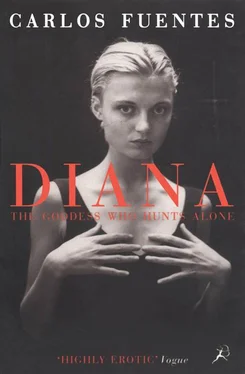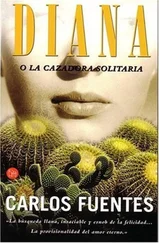Carlos Fuentes - Diana the Goddess Who Hunts Alone
Здесь есть возможность читать онлайн «Carlos Fuentes - Diana the Goddess Who Hunts Alone» весь текст электронной книги совершенно бесплатно (целиком полную версию без сокращений). В некоторых случаях можно слушать аудио, скачать через торрент в формате fb2 и присутствует краткое содержание. Год выпуска: 2012, Издательство: Bloomsbury UK, Жанр: Современная проза, на английском языке. Описание произведения, (предисловие) а так же отзывы посетителей доступны на портале библиотеки ЛибКат.
- Название:Diana the Goddess Who Hunts Alone
- Автор:
- Издательство:Bloomsbury UK
- Жанр:
- Год:2012
- ISBN:нет данных
- Рейтинг книги:3 / 5. Голосов: 1
-
Избранное:Добавить в избранное
- Отзывы:
-
Ваша оценка:
- 60
- 1
- 2
- 3
- 4
- 5
Diana the Goddess Who Hunts Alone: краткое содержание, описание и аннотация
Предлагаем к чтению аннотацию, описание, краткое содержание или предисловие (зависит от того, что написал сам автор книги «Diana the Goddess Who Hunts Alone»). Если вы не нашли необходимую информацию о книге — напишите в комментариях, мы постараемся отыскать её.
Diana the Goddess Who Hunts Alone — читать онлайн бесплатно полную книгу (весь текст) целиком
Ниже представлен текст книги, разбитый по страницам. Система сохранения места последней прочитанной страницы, позволяет с удобством читать онлайн бесплатно книгу «Diana the Goddess Who Hunts Alone», без необходимости каждый раз заново искать на чём Вы остановились. Поставьте закладку, и сможете в любой момент перейти на страницу, на которой закончили чтение.
Интервал:
Закладка:
“You and I share something,” I told Diana one cold, boring night. “We have forever lost the moment of beginning, the glory of our debut. You can lose it in movies, in literature, and in love, you know…”
“You’re talking to a woman who stopped existing at age twenty,” replied Diana. “I was a has-been at twenty.”
I told her how I’d always been fascinated by that expression, the “has-been” implying a closed, finished destiny. I was too optimistic to think that way; I believe we’re incomplete, unfinished individuals. I read and reread three great lines by my favorite poet, Quevedo. (Diana’s never heard of him, but her secretary, Azucena, has and asks me to repeat them. Then I translate them, the three of us at the dining-room table, surrounded by tasteless white figurines in the rented house in Santiago.)
Yesterday’s gone. Tomorrow hasn’t arrived,
today’s going by without stopping an instant;
I am a Was, a Will Be, and an Is grown tired…
Perhaps what the gringos lack, I said in a joking way, is a serious sense of death instead of a tragic sense of fame. No country gives so much value to fame as the United States. It’s the culmination of the great modern fanfare, that blast of trumpets which for half a millennium has been saying that “we” is not enough, that not even “I” is enough, that we need to be known, we need renown, fame. By then, Andy Warhol had already declared we’d all be famous for fifteen minutes. I asked Diana if she really believed her fame had ended when she was twenty. She rested her blond, chiseled head on my shoulder and put her hand on my heart.
“As an actress, yes…”
“You’re wrong,” I consoled her. “Should I tell you what I’m going through now as a writer? I promise you we’re not so different.”
“Can we begin again if we love each other a lot?”
“I think we can, Diana,” I said. I was deeply moved.
Moments like that don’t last. The will for passion can, and I exercised it with Diana against Diana, toward Diana, with all my strength. I was convinced that she felt the same toward me, in her way. For both of us, love was always the opportunity to start over, although, for her, living was living what had yet to be lived, while for me it was knowing again how to live what had already been lived. For better or worse, I don’t want to abandon my own past to a wandering orphanhood.
For Diana, her early triumph in movies and then the mediocrity of her most recent films closed the door of her profession as actress. But that was the profession she got out of bed every morning to practice. From bed I watched her reacting to the alarm clock, drinking the coffee Azucena brought her on a nicely prepared tray (Azucena is a Spanish working woman; she likes her work; what she does makes her proud, so she does it well), slipping on a T-shirt and jeans — much like her most famous character, the maid of Orléans, who discovered the most comfortable style for a warrior woman: to dress like a man — then tying a kerchief over her head, and leaving, throwing me a dry kiss as I’d steal another hour’s sleep. Later I’d wake, remembering night with Diana with intense pleasure. I’d take a shower and shave thinking about what I was going to write (the shower and the razor are my best springboards for creation: water and steel; I must really be Arab, really Castilian). I watched my lover sacrifice and discipline herself for a profession in which she didn’t believe, in which she didn’t see her self, in which she could not even glimpse her future, while I settled down for the rest of the day in this enigma, huge and tiny at the same time: what does Diana Soren really want if what she does is not what she wants to do?
X
The tedium of Santiago became the most tedious theme of our conversations. It seemed we’d reached an unbreachable consensus, in which all of us — Diana and I, her secretary, and the other members of the cast — concurred that Santiago was the most boring place in the world.
Instead of the well-wishing telegrams we usually send to friends on New Year’s Day, this year Diana sent two or three desolate cables. They all said the same thing, just one word: HELP!
Various circles formed. The leading man, famous as the hero of a television series, lived in a large, elegant house on the outskirts of Santiago with his girlfriend and the director, a saturnine but promising man who’d also made a name for himself in television. The melancholy hotel in the center of town was home to the cinematographer — an Englishman who explicitly worshipped at the altar of Onan — and an actor who’d been famous in the workers’ theater movement of the 1930s. But the sun around which the entire production revolved was the leading man, his girlfriend, and the director.
“They’re very nice, and I get along well with them,” said Diana. “But the deal is that we live apart and see one another very little. They like to spend their evenings drinking beer and playing poker.”
Something we would never do. But I did wonder what, aside from loving each other a great deal, we would do to pass the nights. Diana told me she’d invited the character actor of the film, an American named Lew Cooper, to live with us. “Don’t worry. He’s sixty and very intelligent. You’ll like him.”
I knew very well who he was. First, because he was the greatest actor in Clifford Odets’s plays during the 1930s and in Arthur Miller’s in the 1940s. Second, because he was one of the victims of Senator McCarthy’s witch-hunt in the 1950s. I was disgusted by all those who’d squealed on their colleagues, condemning the victims to hunger and, sometimes, to suicide. On the other hand, all those who, like Lillian Hellman, had refused to accommodate conscience to the political fashions of the day were my heroes. Cooper strangely fell between the two categories. Some said he was a totally apolitical man and that his statements to the House Un-American Activities Committee had been innocuous: he’d named those who’d already been named or who’d come forward and declared themselves Communists. He never added an unpublished name, so to speak, to the inquisitor’s list. But even if he’d actually informed on no one, the moral fact is that he did give names, or at least repeat them.
How do you judge that kind of action? Cooper went on working. Others, who refused to talk, never again set foot on a movie set. Not part of the U.S. political world but from a moral world that transcended it, I was caught between my leftist convictions and my personal ethics, which rejected facile Manichaeanism and, above all, the slightest hint of Pharisaism. Was the case difficult to judge precisely because it stood between bloodthirsty, vengeful, envious, opportunistic squealing and the weaknesses and failures to which, perhaps, all of us are susceptible? Cooper’s moral ambiguity made him more interesting than blameworthy. One among so many people had to be my own double. Who could reassure me that under certain circumstances I myself wouldn’t have done what he did? My entire intellectual and moral self rebelled against the idea. But my sentimental side, human, affectionate, or whatever you’d like to call it, tended to forgive Cooper, just as one day someone else would have to forgive me something. There are people who replicate our weakness because we instantly recognize ourselves in them. Cooper deserved not my censure but my compassion.
Anyway, I was curious about all the people involved in the film, but Diana lost patience with my questions. “Hollywood adores capsule biographies. They save time and, best of all, excuse us from thinking. They let us put on airs of being objective, but actually we’re just swallowing gossip consommé. Marilyn Monroe: a sad, lonely little girl. Irresponsible father. Insane mother. Bounced from orphanage to orphanage. She never should have stopped being Norma Jean Baker. She couldn’t stand the burden of being Marilyn Monroe — pills, alcohol, death. Rock Hudson: an extremely handsome truck driver from Texas. Used to driving the highways by night, he would pick up boys and make love to them. He’s discovered. He becomes a star. He’s got to hide his homosexuality. He’s locked in a closet filled with spotlights and cameras. Everyone knows he’s a queen. The world has to believe he’s the most virile of leading men. Who disillusioned them? Death, death …”
Читать дальшеИнтервал:
Закладка:
Похожие книги на «Diana the Goddess Who Hunts Alone»
Представляем Вашему вниманию похожие книги на «Diana the Goddess Who Hunts Alone» списком для выбора. Мы отобрали схожую по названию и смыслу литературу в надежде предоставить читателям больше вариантов отыскать новые, интересные, ещё непрочитанные произведения.
Обсуждение, отзывы о книге «Diana the Goddess Who Hunts Alone» и просто собственные мнения читателей. Оставьте ваши комментарии, напишите, что Вы думаете о произведении, его смысле или главных героях. Укажите что конкретно понравилось, а что нет, и почему Вы так считаете.












